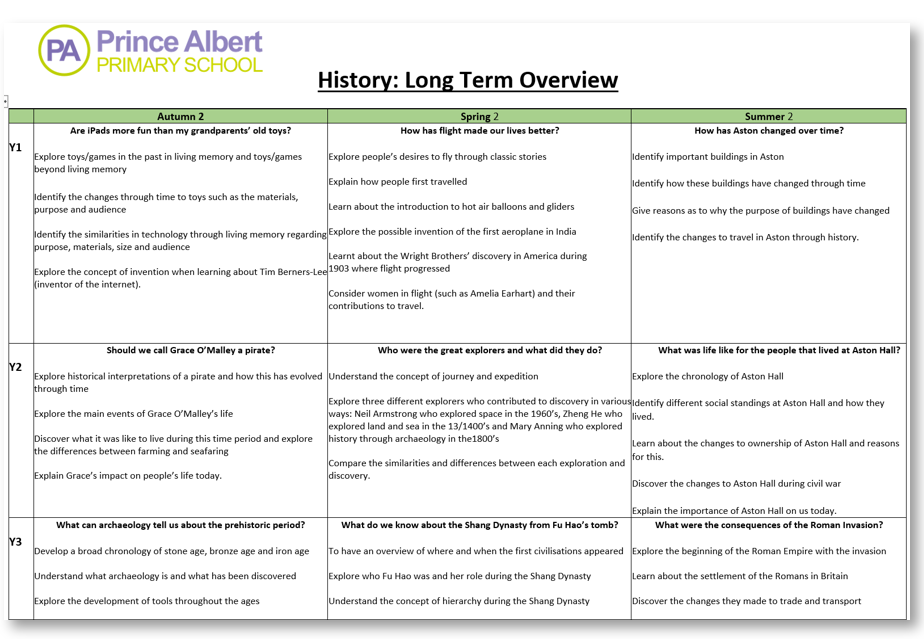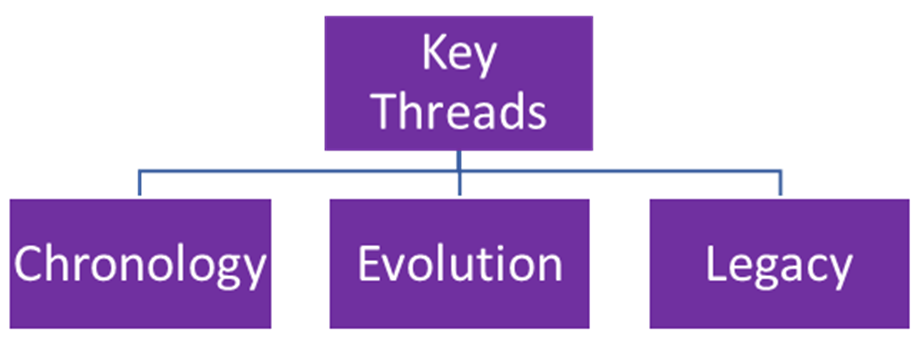HISTORY
“The more you know about the past, the better prepared you are for the future” - T. Roosevelt
Intent
At Prince Albert Primary School, we recognise that history fires pupils’ curiosity about the past in Britain and the wider world. We want our pupils to consider how the past influences the present, what past societies were like, how these societies were organised, and what beliefs and cultures influenced people’s actions.
We want our pupils to develop a strong knowledge of chronology as this will enable them to understand their own place in history. Our aim is that pupils will understand the changes that took place during different time periods but also the aspects that stayed the same (evolution). Pupils will understand the legacy of different time periods and aspects within it, such as advances in trade. Pupils will be able to describe key events in history and a range of diverse people who have played a significant role. They will see the diversity of human experience and understand more about themselves as individuals and members of society.
We want our pupils to develop critical enquiry skills and to be able to evaluate a range of primary and secondary sources, including Information Communication Technology (ICT), as a stimulus and source of information. Our historians will be able to explain clearly how these sources give us an insight about how people around the world used to live and how these interpretations may differ.
In summary, our aim is to encourage pupils to develop an appreciation and understanding of how the past has shaped our lives. We aspire for pupils to develop a passion for history and apply the skills and knowledge they have learnt to other areas of the curriculum.
Implementation LONG TERM OVERVIEW
At Prince Albert School, our history curriculum is taught across the second half of each term throughout the year. Units of work have been sequentially developed in order to build upon pupil’s prior learning in order that they know more and remember more. Our curriculum ensures coverage of the national curriculum and also takesinto account the school context by ensuring that key historical figures, events and places have been carefully chosen in order to represent the diversity of people who live in our world.
Each unit of work begins with an enquiry question. This enables pupils to develop critical thinking skills and gives learning a purpose and context.
We have three key threads that drive our history curriculum.

We specifically chose these to ensure that pupils understand the links between themselves and the past. They are closely linked to the key threads in the geography curriculum – sustainability – impact and change. Our humanities curriculum has been carefully planned to ensure that they complement each other and so that pupils can apply their knowledge across both history and geography.
Our curriculum begins in the Early Years Foundation Stage (EYFS) where our children listen to a broad selection of stories, non-fiction texts, rhymes and poems which foster their understanding of our culturally, socially, technologically and ecologically diverse world. Children are introduced to vocabulary associated with history as they explore the passing of time in their own lives and learn about significant events in the recent past– this is the first step to becoming a historian.
In KS1, historical skills focus on the world around them and their living memory of history before moving to events that go beyond living history. This ensures a firm foundation for KS2 history.
In KS2, the history curriculum is set out in chronological order to allow pupils to reference previous events in time. All pupils are required to make connections and historical links with prior learning of people, events, societies and epochs. Further relevance is provided when pupils explore significant figures and locations in their local area, allowing them to achieve a sense of relevance and belonging through local history.
In lessons, pupils use retrieval skills to access prior knowledge which will support them in their current and future learning. They are encouraged to evaluate primary and secondary sources to develop the skills of enquiry, analysis, interpretation and problem-solving. Lessons are appropriately adapted for pupils who need additional support.
Educational visits are a key part of our history curriculum. They offer an opportunity for the teachers to plan for additional history learning outside the classroom. Our pupils explore local museums and places of interest. Visitors into school enhance the learning and provide first hand experiences. Pupil’s enthusiasm for history is also enhanced through coverage across many other areas of the curriculum, particularly in literacy and geography.
Staff receive regular subject specific training. The subject leader attends external training and keeps up to date with the latest research to ensure current knowledge of advancements in history teaching. All staff have access to the National College to further develop their subject knowledge. The subject leader also attends regular history network meetings across the Trust.
The subject leader and senior leadership team monitor coverage and development of history through book monitoring, learning walks and staff and pupil voice.
Impact
Our history curriculum enables opportunities for pupils to build upon concepts from one year to the next. Therefore, by the time pupils leave year 6, they will be equipped with a range of historical skills that will provide a solid foundation for future learning.
Pupils are able to talk with confidence and enthusiasm about what they have learnt in history, using subject specific vocabulary. Pupils take part in regular assessments throughout a history unit by completing Key Learning Tasks (KLT) which contribute to the summative assessments.
At Prince Albert School, pupils become increasingly critical and analytical within their thinking, developing the skills required to make the transition to KS3. They become increasingly aware of how historical events and people have shaped the world that they currently live in. Pupils are able to use their knowledge to answer enquiry questions and have a strong understanding of chronology, evolution and legacy within each unit. Pupils are able to retain prior-learning and explicitly make connections between what they have previously learned and what they are currently learning.
